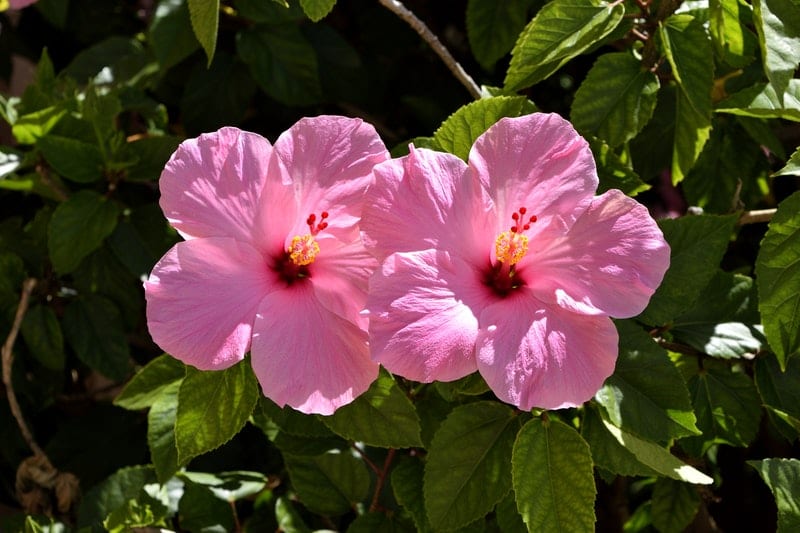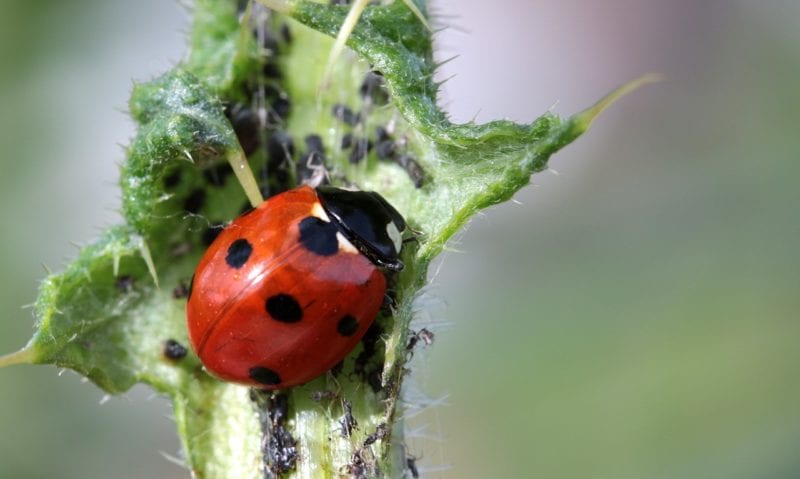
The hibiscus is usually supposed to provide a southern flair in our home garden. But the hibiscus is not safe from domestic pests such as aphids. Just when the shoots begin to sprout, the hibiscus is attacked by the aphids. The plant is literally drained of its lifeblood and can die as a result. How can you proceed to control the aphids on the hibiscus?
I would now like to present effective tips on how to protect your hibiscus and successfully fight the aphids.
Contents
The damage caused by the aphids
The hibiscus is a frequent target of aphids. They are attracted to the large colorful flowers. Therefore, it is no coincidence that the aphids, increasingly target this plant. Therefore, it is necessary that you start early to drive away the aphids on the hibiscus.
When fresh shoots sprout, the likelihood is greatest that aphids will gather on the plant. Aphids can be identified by the black colonies they form on the plant. Aphids do not stop at the leaves and flowers of the plant. They infest the entire hibiscus and cause serious damage there.
The sweet sap produced by the hibiscus serves as food for the aphids. If too much damage is done to the plant and too much sap is diverted, then as a result the leaves turn brownish. If no countermeasures are taken against the pests, it is foreseeable within a few days or weeks that the hibiscus will die.
If a plant is so weakened that it no longer produces sufficient sap, then the aphids will move on and look for the next plant. Thus, aphids may infest the entire garden.
It is not only the damage caused by sucking that is instrumental in the poor health of the hibiscus, but also the establishment of fungi. This is because the excretions of the aphid are an ideal breeding ground for the sooty dew fungus. The colonization by the fungus affects the photosynthesis of the hibiscus and further weakens it.
Preventing the aphids on the hibiscus
If the aphids have already infested the hibiscus, it may already be too late for a successful rescue. To avoid the risk of aphids attacking the hibiscus in the first place, some preventive measures can be taken.
Aphids feed mainly on weak plants. With those, it is easier for them to get to the plant sap. Therefore, a priority should be that the hibiscus is healthy and strong.
When buying should already make sure that the hibiscus has some buds and strong shoots. If there are only leaves, then it is more difficult to assess whether the plant is actually hardy enough to survive in the garden.
Once the hibiscus has arrived in the garden, then the location should not be changed too often. The hibiscus places a lot of importance on constant light and weather conditions. Frequent changes of location can weaken it. Likewise, the water should not be too cold and the plant should be provided with sufficient nutrients.
If the hibiscus is kept indoors, then dry air can lead to poorer health. Here it can be helpful if you mist and spray the hibiscus with water from time to time.
A real all-purpose weapon for strengthening the hibiscus is watering with neem products. These provide the necessary nutrients and the plant becomes more resistant overall.
Getting rid of aphids on hibiscus
If the aphids have nested on the hibiscus, then there are several remedies for aphids and approaches.
The first step should be to isolate the hibiscus from other plants. This will prevent the aphids from spreading to other plants. However, this is really only practical if it is a potted plant.
After that, the hibiscus should be washed thoroughly. The water will remove the aphids from the plant. This should be done very thoroughly and until there is not a single aphid left on the plant. To achieve this, the leaves should be washed off from both sides.
Natural soapy water
To really make sure that all the animals are gone from the hibiscus, you should make a soapy water. This is a very natural remedy against aphids and should be used after the aphids have already been controlled with normal water.
Do not use commercial dishwashing detergents. These contain active ingredients that can harm the hibiscus and are rarely natural. It is better to resort to a special agent against aphids.
The following remedy from Neudorff is ideal for combating aphids on hibiscus.
The soap mixture naturally fights the aphids. This has the advantage that no other insects are affected. For example, bees are not harmed by this mixture.
Chemical means against aphids
If aphids have still appeared on the hibiscus despite treatment with the soap suds, then the soap suds were probably not effective enough. This can happen if the soap suds were not completely applied to the hibiscus from both sides.
Chemical agents can also be used against aphids. These agents are absorbed by the plant through the root. There they enter the organism of the aphid through the sap of the plant. Thus, all aphids are caught for sure, even those that have hidden under the leaves from the soapy water. These agents protect the hibiscus for several weeks.
Use ladybugs

The aphids are a favorite meal for the ladybug. If you find ladybugs in your garden, you can collect them and put them on the affected plants. There, the spotted friends will get right to work and exterminate the aphids.
If you can’t find ladybugs in your garden, then you can also purchase some at a garden supply store. In many cases, ladybugs are in stock, as they have proven to be a very effective weapon against aphids or spider mites.
However, it should be noted here that an overstock of ladybugs may result from next year’s aphid infestation.
Nettle infusion
If you do not have soap suds available, but have the opportunity to quickly get hold of nettles, then you can make a decoction with these flowers. To do this, the nettles should be doused with water.
The decoction is then left for three days, so that the effect of the nettle is transferred to the decoction. After that, the decoction is sprayed on the hibiscus in the hope that all aphids will be successfully driven away.

